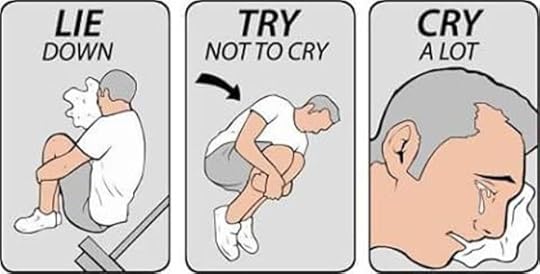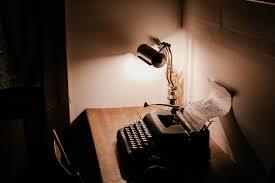How to Deal with Rejection as a Writer

Lightning Strikes has been rejected by two agents so far.
Did you know that the quintessential, maybe even the greatest, American novel was rejected? According to a MasterClass article, when F. Scott Fitzgerald submitted The Great Gatsby to his publisher, he received this note from an editor: “You’d have a decent book if you’d get rid of that Gatsby character.” ARE YOU KIDDING ME? The novel was published by Scribner’s in 1925, with Jay Gatsby intact. While The Great Gatsby was criticized and sold poorly during Fitzgerald’s lifetime, it is now regarded as the Great American Novel and is a staple in high school curricula.

So rejection is part and parcel of being a writer. Even the good ones get rejected.
Did you know Stephen King’s first novel, Carrie, was rejected more than 30 times before being published in 1974 by Doubleday? Legend has it that the manuscript was actually turned down 80 times. Holy snot. According to the same MasterClass article, one rejection letter read: “We are not interested in science fiction which deals with negative utopias. They do not sell.” King kept rejection letters in his bedroom as a form of motivation to continue writing and submitting. After publishing a few novels, King submitted a number of short stories under the nom de plume Richard Bachman to see if his success could be replicated without his famous name. AND IT WAS!

Neil Gaiman offers these four tips for dealing with rejection:
Share your feelings with a friend, and remember not to take the blow personally.It’s ok to be sad. You can even stop writing for a while if you need to. Concentrate on something else and then come back.Alternatively, you can take a different attitude and, in Gaiman’s words, “write something so brilliant that nobody could ever reject it.”Establish and maintain a writing ritual in order to promote self-worth after the sting of rejection. This includes creating and sticking to a project timeline, managing productivity with goals, and rewarding yourself when daily goals are met.[image error]I found this article from the aptly named Writers.com that offers ten tips for dealing with rejection.
Grieving periodI give myself 24 hours. I eat some pasta (or have some chocolate), but then I have to move on.Allow yourself to feel sad (outside of grieving process)
Honestly, this is just good mental health practice. Feelings have to be felt cleanly. This does not allow for wallowing, but it is an acknowledgment that rejection sucks, and the feelings of inadequacy and maybe even worthlessness will pop up from time to time.Don’t take it personal
This is much easier said than done. But a good mantra to repeat to yourself is this: The work was rejected, not me. And it’s good to remember that King, Rowling, Melville, and Fitzgerald were all rejected multiple times.Learn the difference between useful criticism and useless criticism
It’s best to be selective about the criticism you take seriously as a writer. I’ve been emailing with my beta reader, and I recently asked for clarification regarding one of her concerns. She’s been outstanding thus far, and I know her criticism is useful and worth the effort. Had it been mean-spirited or more about me as a writer than about the work, I would have ignored it.Edit your work
In my last post, I actually wondered if I was done editing Lightning Strikes. I don’t think I am. Granted the agents I’ve queried so far haven’t asked for more than the first twenty pages or so, but I know I rushed the ending and that’s exactly what me and my beta reader have been discussing. We met at the University of Limerick and funnily enough, the article says, “You could ask your writerly friends to read through it and give their honest feedback—maybe your old classmates from that English lit course in college?“Remind yourself why you love writing
I LOVE getting signs from the universe. My colleague and fellow writer, who’s about to publish her first novel (!), stopped by my room this morning to rave about a writer’s conference she recently attended, and she literally handed me a list of reasons why people write. Wild.Take a break
Again, this came up in my last blog post; maybe I need a long weekend somewhere. Or a staycation without writing.Learn from the rejection
Again, this might be easier said than done. But the article says it so eloquently: “Every rejection brings a lesson or lessons within it. These may be difficult to see, but at the very least, take each writing rejection as a chance to be strong and grow thicker skin. The plain truth is that not everyone will love your story: every story in the world has people who dislike it. What matters is that you put in the effort you need to be genuinely proud of your work.”Work on another project
I’m still trying to decide what that will be.Join a community of writers
My friends and classmates from Ireland have been filling this role quite nicely, but there are opportunities closer to home I plan on exploring very soon.Face your fear of rejection
Ultimately, to live is to face rejection. Rejection by publishers, by potential employers, by friends or romantic partners: we all have to accept, learn from, and let go of these painful experiences.
To deal effectively with writing rejection, the most important things we can do are to let ourselves grieve, and learn from useful feedback while disregarding useless feedback.
Frederick Meyer

The post How to Deal with Rejection as a Writer appeared first on mandi bean: writer.



